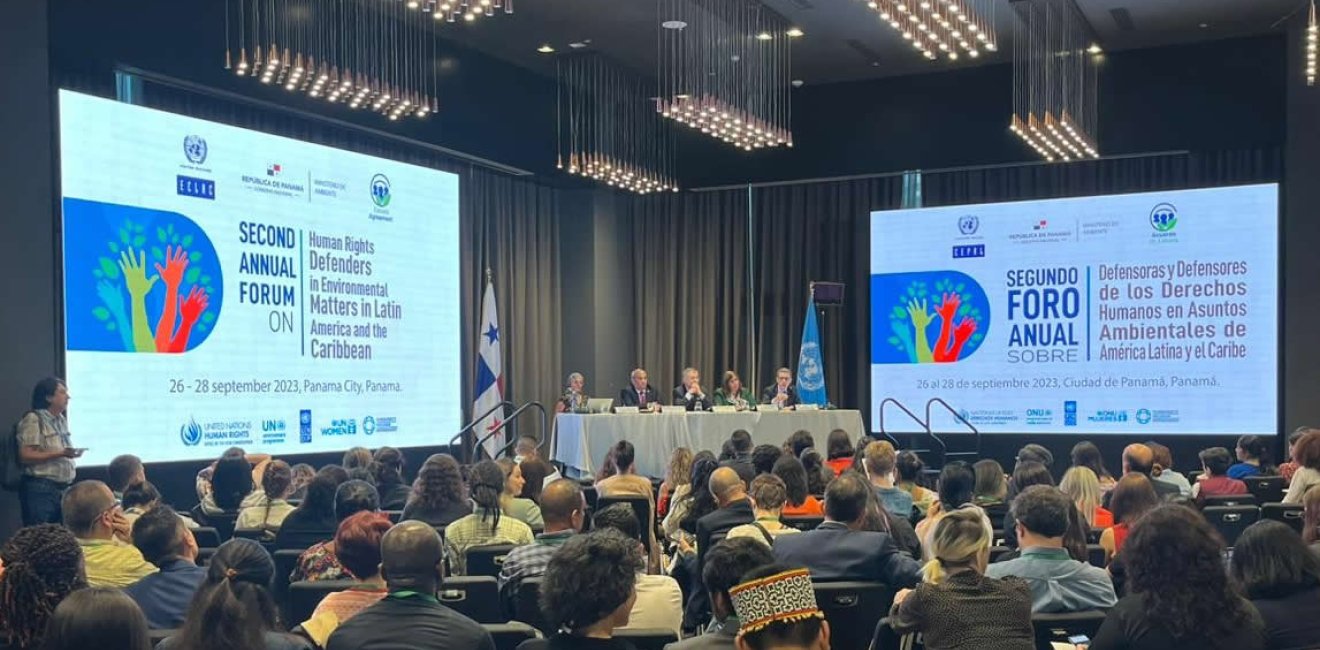
A blog of the Latin America Program
Eight out of the top 10 countries with the most killings of environmental defenders are in Latin America, where the first and only legally binding international accord explicitly intended to protect the rights of environmental defenders was adopted. The Regional Agreement on Access to Information, Public Participation, and Justice in Environmental Matters in Latin America and the Caribbean, known as the Escazú Agreement after the city in Costa Rica where it was signed, was a milestone, but only 25 of 33 Latin American and Caribbean states have signed it and only 15 have ratified it.
Eight out of the top 10 countries with the most killings of environmental defenders are in Latin America.”
The accord expands upon similar initiatives, such as the European Aarhus Convention, by enshrining the value of public participation as key for environmental protection, guaranteeing the right of present and future generations to a healthy environment, and codifying the obligation to protect environmental defenders. Given the environmental degradation in the Americas and the region’s macabre status as a graveyard for environmental defenders, there was clearly a need for such an agreement. So why have so many countries refused to sign or ratify the treaty?
Some opponents have argued that it is bad for business, while others have spread misinformation about the agreement. But the fundamental challenge might be that the agreement demands greater transparency and accountability at a time when many governments in the region are becoming less democratic.
What’s in the Agreement?
The Escazú Agreement aims to accomplish three main goals: to ensure that the public has reasonable and timely access to information about environmental public policy issues; to provide meaningful opportunities for public participation in environmental decision-making; and to ensure the right of access to justice in environmental matters. Finally, the agreement obliges states to protect environmental defenders who square off against governments and companies, often at great personal peril.
Of course, law enforcement in the region should already be protecting environmental defenders. However, this explicit recognition was important, as Latin America is the most dangerous part of the world for environmental defenders. In 2022, the British NGO Global Witness recorded the murders of 177 environmental and land defenders globally and a staggering 156, or 88%, occurred in Latin America. Colombia experienced the most killings (60), followed by Brazil (34), Mexico (31), and Honduras (14). Among these countries, only Mexico has signed and ratified the Escazú Agreement. Many of the killings followed a familiar pattern: an activist opposing an environmentally damaging project was killed by a business or criminal enterprise involved in the project. Murder is not the only method of silencing environmental defenders. In 2022, the human rights organization Front Line Defenders found that governments oftentimes arrest, detain, or otherwise harass activists. There is also physical and psychological violence. Women defenders of the Amazon in Brazil, Peru, and Colombia most often reported that the individuals threatening them were people they did not know, people belonging to armed groups, or representatives of state actors, but a surprising number of threats came from within their social circles.
These threats helped motivate the negotiation of the Escazú Agreement and the push for its widespread adoption. Yet most of the countries where environmental defenders are most at risk, including Brazil, Colombia, Honduras, and Peru, have not adopted the agreement.
Why are Some Countries not Ratifying Escazú?
Despite the pathbreaking provisions of the agreement, the ratification process in several Latin American countries has been unexpectedly slow. Broadly, the arguments against joining are that doing so would harm businesses and infringe on territorial sovereignty, or that existing domestic laws make the agreement superfluous.
Despite the pathbreaking provisions of the agreement, the ratification process in several Latin American countries has been unexpectedly slow.”
Unsurprisingly, resistance has come mostly from conservative governments and extractive industries. However, other opposition reflects discomfort among various governments to increase transparency and broaden public participation in decision making. As a result, interest in the agreement has fluctuated depending upon who is in office. Costa Rica, for example, helped negotiate the agreement under President Carlos Alvarado Quesada, but shelved it in 2023 under pro-business President Rodrigo Chaves. In Brazil, the opposite happened. Former President Jair Bolsonaro declined to send the agreement to Congress, but his successor, President Luis Inacio Lula da Silva, reversed course in May 2023. (Lawmakers have not ratified the treaty, amid opposition from agribusiness.) Similarly, Chile opposed ratification prior to the election of President Gabriel Boric, but ratified the agreement in 2022.
So far, So Good?
Meanwhile, in countries that have signed and ratified the Escazú Agreement, implementation has been slow. This has been especially true of the provisions about access to justice. The United Nations reports that 24 countries in the region guarantee the freedom of information and 25 promote public participation in decisions about environmental rules. However, only 20 countries allow any person or group to sue in defense of the environment and just six have approved specific protections for environmental defenders. Assuring compliance has also been difficult, as there is no international enforcement system.
In a region with a long history of resource extraction and human rights abuses, and where democratic decline is accelerating, the Escazú Agreement was a major step. However, the agreement’s impacts will be limited absent broader adoption of the treaty and compliance with its obligations. For now, the region’s environmental defenders continue risking their lives to protect everyone’s right to a healthy environment.
Authors

Independent Scholar

Latin America Program
The Wilson Center’s prestigious Latin America Program provides non-partisan expertise to a broad community of decision makers in the United States and Latin America on critical policy issues facing the Hemisphere. The Program provides insightful and actionable research for policymakers, private sector leaders, journalists, and public intellectuals in the United States and Latin America. To bridge the gap between scholarship and policy action, it fosters new inquiry, sponsors high-level public and private meetings among multiple stakeholders, and explores policy options to improve outcomes for citizens throughout the Americas. Drawing on the Wilson Center’s strength as the nation’s key non-partisan policy forum, the Program serves as a trusted source of analysis and a vital point of contact between the worlds of scholarship and action. Read more


Brazil Institute
The Brazil Institute—the only country-specific policy institution focused on Brazil in Washington—aims to deepen understanding of Brazil’s complex landscape and strengthen relations between Brazilian and US institutions across all sectors. Read more

Explore More in Weekly Asado
Browse Weekly Asado
Dengue Haunts South America’s Summers

Lessons from Costa Rica’s Economic Transformation

Women and Latin America’s Digital Revolution

